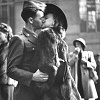The Things They Carried |
 Oct 19 2007, 10:31 PM Oct 19 2007, 10:31 PM
Post
#1
|
|
 DDR \\ I'm Dee :)        Group: Mentor Posts: 8,662 Joined: Mar 2006 Member No: 384,020 |
I tried to search this, but didn't get anything.
At my school it's required reading. You either read it Sophmore or Senior year, and I ended up reading it this year. I just hope it's not one of those books that constantly reminds me of the current war. Have any of your read this? Thoughts? Comments? |
|
|
|
 |
Replies
 May 15 2008, 06:54 PM May 15 2008, 06:54 PM
Post
#2
|
|
 isketchaholic       Group: Staff Alumni Posts: 2,977 Joined: Apr 2007 Member No: 516,154 |
O<MGDGSED!!!
lol I loved this book. O'Brien had an amazing way of describing death; he described some deaths to be just so incredibly beautiful. if anyone remembers the story about Kurt Lemon and the way he dies...yeah it's just gorgeous. the point was that death could be beautiful, and so could war. War makes soldiers aware of life, infinitely more sensitive to their surroundings and their aliveness than they would be without it. The problem of course, is finding a meaning in life after returning from war. The war wasn't in america's backyard, it was across an ocean: soldiers came back and weren't understood, weren't acknowledged. The story of Norman Bowker is amazing in describing the alienation felt by soldiers upon their return to normal life and their struggle with fitting back in; of course Tim O'Brien uses brilliant imagery and parallels to convey nostalgia. zomg technicolored flares in a shit field vs 4th of July fireworks over a lake. the book gives great insight into the mindset of war veterans and the ways in which war haunts them for the rest of their life. anyways there's a lot to talk about, but I don't want to get too carried away at the moment heh |
|
|
|
Posts in this topic
 karmakiller The Things They Carried Oct 19 2007, 10:31 PM
karmakiller The Things They Carried Oct 19 2007, 10:31 PM
 moorepocket i never heard of it. Oct 19 2007, 10:37 PM
moorepocket i never heard of it. Oct 19 2007, 10:37 PM
 krnxswat I didn't get a chance to read the whole book, ... Oct 19 2007, 10:41 PM
krnxswat I didn't get a chance to read the whole book, ... Oct 19 2007, 10:41 PM
 Synesthesia I read it this year, and I'm a junior.
I thou... Oct 19 2007, 10:41 PM
Synesthesia I read it this year, and I'm a junior.
I thou... Oct 19 2007, 10:41 PM
 treschicgeek I read it last year. It was a pretty good book to ... Oct 20 2007, 11:22 AM
treschicgeek I read it last year. It was a pretty good book to ... Oct 20 2007, 11:22 AM
 Villainess I'm currently reading this in my world literat... Oct 20 2007, 11:38 AM
Villainess I'm currently reading this in my world literat... Oct 20 2007, 11:38 AM
 karmakiller People who have read this before said that it swit... Oct 20 2007, 11:06 PM
karmakiller People who have read this before said that it swit... Oct 20 2007, 11:06 PM
 krnxswat Stop being such a pussy. Oct 21 2007, 01:46 AM
krnxswat Stop being such a pussy. Oct 21 2007, 01:46 AM

 karmakiller QUOTE(krnxswat @ Oct 21 2007, 01:46 AM) S... Oct 21 2007, 07:50 PM
karmakiller QUOTE(krnxswat @ Oct 21 2007, 01:46 AM) S... Oct 21 2007, 07:50 PM
 Relentless o.O This book.
The school's senior AP English... Oct 21 2007, 02:11 AM
Relentless o.O This book.
The school's senior AP English... Oct 21 2007, 02:11 AM
 Synesthesia Bump, since Betty was thinking about making a topi... May 14 2008, 05:20 PM
Synesthesia Bump, since Betty was thinking about making a topi... May 14 2008, 05:20 PM
 fig A beautiful book.
One of my favorites of all time... May 15 2008, 12:47 PM
fig A beautiful book.
One of my favorites of all time... May 15 2008, 12:47 PM
 brooklyneast05 it's pretty good. May 15 2008, 01:08 PM
brooklyneast05 it's pretty good. May 15 2008, 01:08 PM
 Teesa i absolutely loved this book! definitely one o... May 15 2008, 02:52 PM
Teesa i absolutely loved this book! definitely one o... May 15 2008, 02:52 PM
 paperplane I was supposed to read the story for English last ... May 15 2008, 02:57 PM
paperplane I was supposed to read the story for English last ... May 15 2008, 02:57 PM
 The-March-Hare I was supposed to read this for my American Lit cl... May 19 2008, 06:03 AM
The-March-Hare I was supposed to read this for my American Lit cl... May 19 2008, 06:03 AM
 dreamstar7 I read it earlier this year for American Lit, and ... May 20 2008, 04:38 PM
dreamstar7 I read it earlier this year for American Lit, and ... May 20 2008, 04:38 PM
 SilentLaugh Who's it by? May 20 2008, 04:40 PM
SilentLaugh Who's it by? May 20 2008, 04:40 PM
 dreamstar7 QUOTEWho's it by?
Tim O'Brien May 20 2008, 04:44 PM
dreamstar7 QUOTEWho's it by?
Tim O'Brien May 20 2008, 04:44 PM  |
1 User(s) are reading this topic (1 Guests and 0 Anonymous Users)
0 Members:







